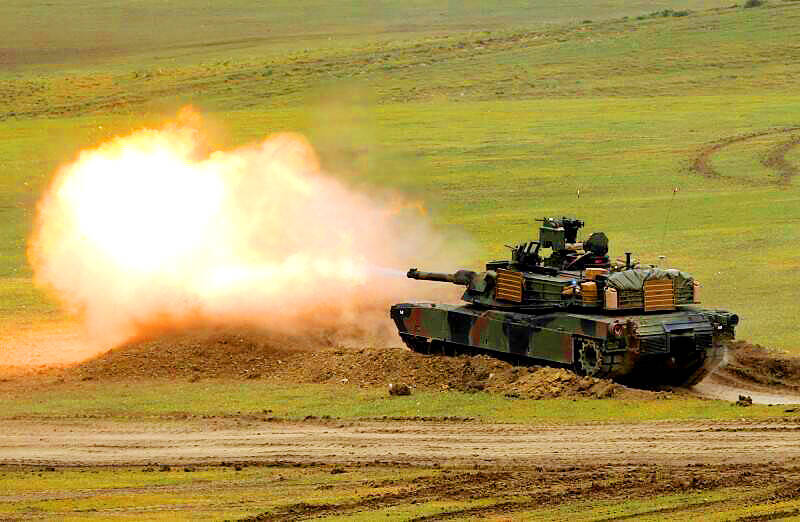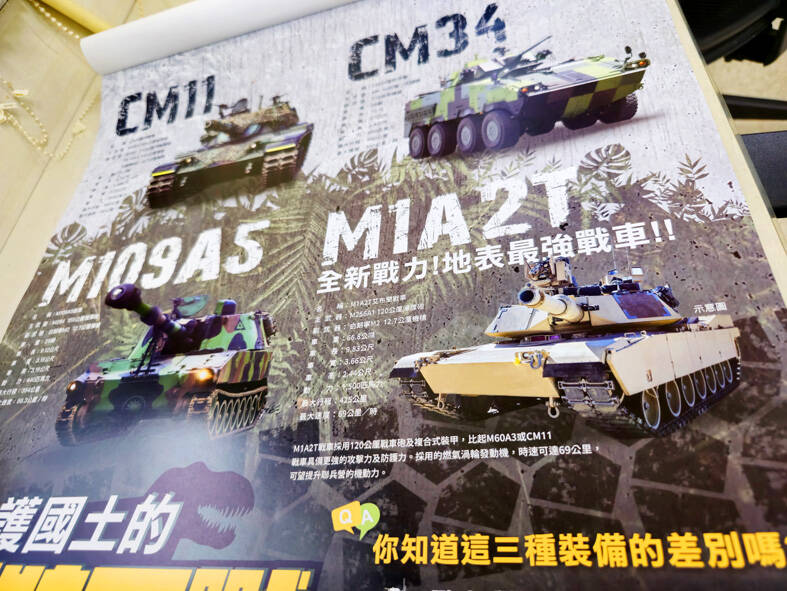A shipment of 38 US-made M1A2T Abrams tanks — part of a military procurement package from the US — arrived at the Port of Taipei early yesterday.
The vehicles are the first batch of 108 tanks and other items that then-US president Donald Trump announced for Taiwan in 2019. The Ministry of National Defense at the time allocated NT$40.5 billion (US$1.25 billion) for the purchase.
To accommodate the arrival of the tanks, the port suspended the use of all terminals and storage area machinery from 6pm last night until 7am this morning.

Photo: Reuters
The tanks are expected to be deployed at the army’s training facility in Hsinchu County’s Hukou Township (湖口), where training on the tanks would start after the Lunar New Year holiday, a source said.
The “T” in the M1A2T denotes that the tanks are a special version for Taiwan, they said.
The military is to receive a shipment of 42 Abrams tanks and another of 42 tanks over the next two years, Ministry of National Defense records showed.

Photo: Fang Wei-li, Taipei Times
The Abrams is “decades more advanced than” the combat vehicles the army currently uses, and the tank’s 120mm main gun would enable the military to compete with the main battle tanks used by the Chinese People’s Liberation Army, the source said.
“The average speed of the new tanks is also twice that of Taiwan’s current tanks, which would enhance the efficiency of troop reinforcements,” they said.
“Furthermore, the Abrams’ aiming capability is more than five times that of Taiwan’s current tanks, and it can maintain a continuous hit rate,” they added.
The M1A2Ts are equipped with a thermal management system that can significantly reduce the leakage of heat from the modern electronic equipment on board, enhancing their concealment on the battlefield, they said.
In an interview with the Liberty Times (the Taipei Times’ sister paper) published on Dec. 6, retired major general Kuo Li-sheng (郭力升) said the M1A2T Abrams tanks would be a generation ahead of Taiwan’s US-made M60A3s and the indigenously developed CM11 tanks, which have designs dating to the 1980s.
“Fielding the M1A2T would not only increase the army’s numerical strength, but would be a qualitative leap forward,” he said, adding that Taiwan has sought to acquire the tanks since the 1990s.

SECURITY: As China is ‘reshaping’ Hong Kong’s population, Taiwan must raise the eligibility threshold for applications from Hong Kongers, Chiu Chui-cheng said When Hong Kong and Macau citizens apply for residency in Taiwan, it would be under a new category that includes a “national security observation period,” Mainland Affairs Council (MAC) Minister Chiu Chui-cheng (邱垂正) said yesterday. President William Lai (賴清德) on March 13 announced 17 strategies to counter China’s aggression toward Taiwan, including incorporating national security considerations into the review process for residency applications from Hong Kong and Macau citizens. The situation in Hong Kong is constantly changing, Chiu said to media yesterday on the sidelines of the Taipei Technology Run hosted by the Taipei Neihu Technology Park Development Association. With

CARROT AND STICK: While unrelenting in its military threats, China attracted nearly 40,000 Taiwanese to over 400 business events last year Nearly 40,000 Taiwanese last year joined industry events in China, such as conferences and trade fairs, supported by the Chinese government, a study showed yesterday, as Beijing ramps up a charm offensive toward Taipei alongside military pressure. China has long taken a carrot-and-stick approach to Taiwan, threatening it with the prospect of military action while reaching out to those it believes are amenable to Beijing’s point of view. Taiwanese security officials are wary of what they see as Beijing’s influence campaigns to sway public opinion after Taipei and Beijing gradually resumed travel links halted by the COVID-19 pandemic, but the scale of

A US Marine Corps regiment equipped with Naval Strike Missiles (NSM) is set to participate in the upcoming Balikatan 25 exercise in the Luzon Strait, marking the system’s first-ever deployment in the Philippines. US and Philippine officials have separately confirmed that the Navy Marine Expeditionary Ship Interdiction System (NMESIS) — the mobile launch platform for the Naval Strike Missile — would take part in the joint exercise. The missiles are being deployed to “a strategic first island chain chokepoint” in the waters between Taiwan proper and the Philippines, US-based Naval News reported. “The Luzon Strait and Bashi Channel represent a critical access

Pope Francis is be laid to rest on Saturday after lying in state for three days in St Peter’s Basilica, where the faithful are expected to flock to pay their respects to history’s first Latin American pontiff. The cardinals met yesterday in the Vatican’s synod hall to chart the next steps before a conclave begins to choose Francis’ successor, as condolences poured in from around the world. According to current norms, the conclave must begin between May 5 and 10. The cardinals set the funeral for Saturday at 10am in St Peter’s Square, to be celebrated by the dean of the College